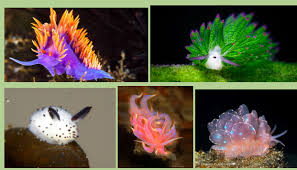Sea Slugs:

Scientists recently identified and formally described two previously unknown species of wart sea slugs found in the waters off North Sulawesi, Indonesia, named Phyllidia ovata and Phyllidia fontjei.
- Sea slugs, also known as Nudibranchs, are soft-bodied marine molluscs found in all the world’s oceans, from shallows to the deep sea.
- They belong to Phylum Mollusca and Class Gastropoda.
- They look like naked snails, i.e., without shells.
- These slow-moving grazers consume algae, sponges, and other small invertebrates, showcasing a range of feeding habits.
- They are usually found in coral reefs and their presence is a significant indicator of a strong coral ecosystem.
- Sea slugs are renowned for their vibrant colours and intricate patterns, which often serve as warning signals to predators due to their toxicity.
- They get their toxicity from the creatures they eat, and some sea slugs can even keep the stinging cells of jellyfish inside their bodies.
- Beyond their striking appearance, sea slugs possess other intriguing traits.
- Some can photosynthesise, producing their own food with sunlight.
- Others regenerate lost limbs, and a few can steal genes from their prey and incorporate them into their DNA.
- Most sea slugs are active throughout the day, but some species are also nocturnal.




